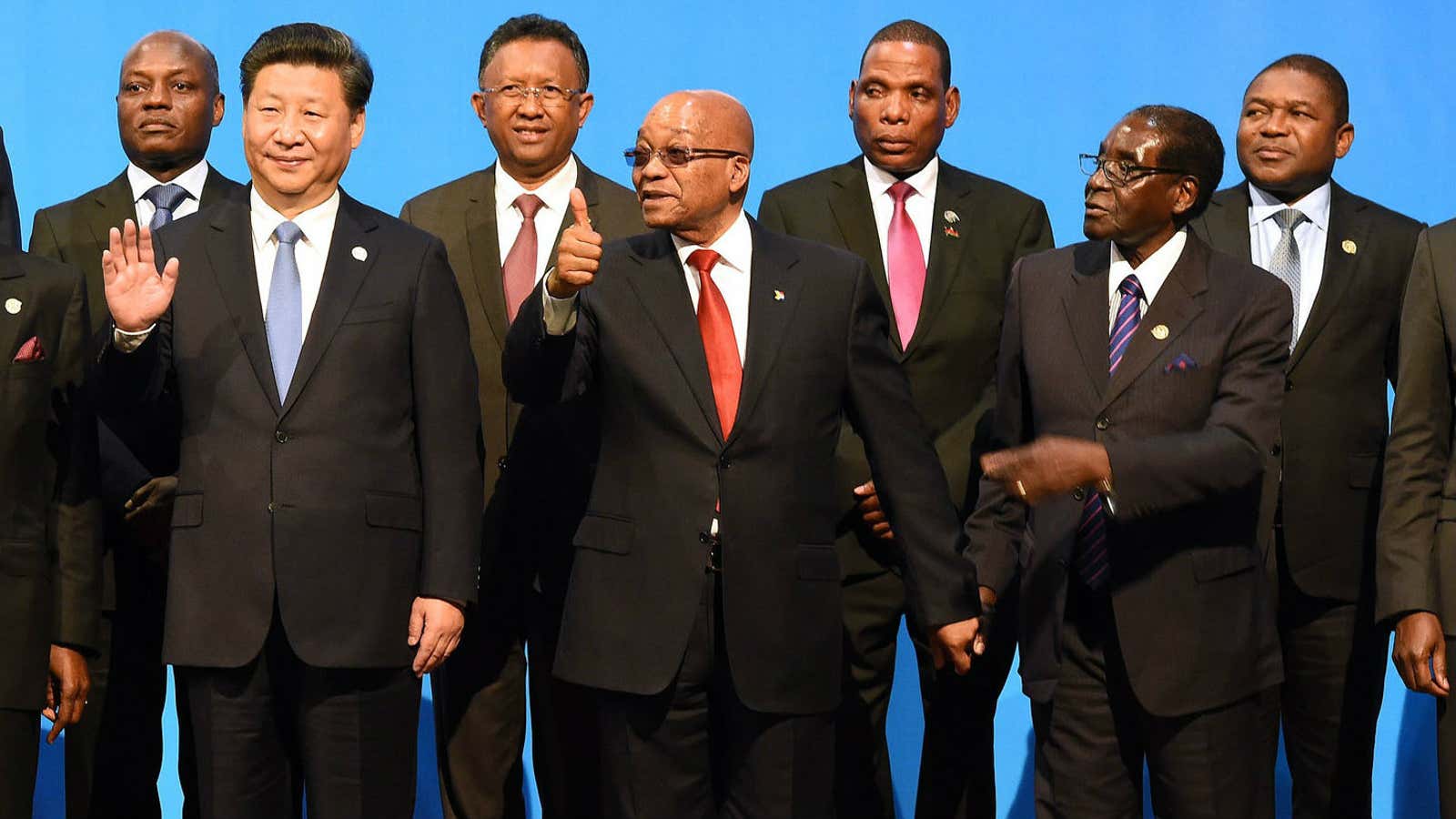At the China-Africa summit in Johannesburg, Chinese President Xi Jinping proposed that: the new type of China-Africa strategic partnership be upgraded to a comprehensive strategic and cooperative partnership.
Xi’s proposal deserves serious and sustained attention by African academics, analysts and governments across all the five broad areas that frame the partnership. These are:
- political equality and mutual trust;
- promoting win-win economic co-operation;
- cultural exchanges;
- mutual assistance in security; and
- solidarity and co-ordination in international affairs.
While the five were approved during previous meetings, Xi linked them to his ten implementation plans. This was backed by US$60 billion in new loans and other assistance for the continent. This is three times larger than the last one in 2012.
Key lessons from the China-Africa summit
African leaders greeted Xi’s address with unqualified praise. Whether Comrade Xi was “God-sent” as Robert Mugabe divined, he appears to have made Africa one of the top priorities of his foreign policy. And unlike his Zimbabwean counterpart, Xi faces the urgency of strict presidential term limits imposed by his party.
Fortunately, Xi is leading a process now 15 years old. Veteran African diplomats recall that in the early rounds, they were only invited to listen. This year marked a real change. There was extensive prior consultation and consensus-building in producing Xi’s ten implementation plans.
But for the plans to succeed, Africa will have to cooperate more extensively. China is also signaling that it expects the larger and more successful countries to assume the role of sub-regional leaders. These include South Africa, Nigeria, Kenya and Ethiopia.
China has singled out the special relationship with these countries by offering them generous assistance.
Its relationship with South Africa is a good example of its willingness to identify key partners. Deciding to hold the summit in South Africa, with President Jacob Zuma as co-chair with Xi, was a highly visible affirmation of this strategy.
In addition, China and South Africa announced 26 agreements with Beijing contributing an estimated US$6.5 billion—more than 10% of its 2015-to-2018 pan-African commitment.
But even within these special partnerships the more economically advanced African countries’ concerns persist, even if they weren’t openly voiced at the summit. A big one is the fact that although Chinese imports may benefit their citizens, they have destroyed indigenous light industry vital for development.
‘Win-win’ still to be tested
China and Africa’s relationship is not yet one of “win-win economic cooperation.” Details are not yet clear about how the ten-point plans are going to implemented in a way that benefits both sides. The plans cover:
- industrialisation
- agricultural modernisation
- infrastructure
- financial arrangements
- “green development”
- trade and investment facilitation;
- poverty reduction
- public health improvements
- culture and people relationships; and
- peace and security
Africa overall still accounts for a mere 3% of China’s global investments and just 5% of its global trade.
And it’s worth noting that China’s biggest economic advances last week were not in Johannesburg but Washington, where the International Monetary Fund finally approved the renminbi as a world currency. This means it now joins the dollar, the euro, the pound and yen.
Mutual assistance in security
China has historically been reluctant to engage on the security issue. But it is beginning to become much more active. Zuma specifically mentioned this with fulsome praise in his speech:
In addition to participating in up to 16 UN Peacekeeping Missions in Africa, China currently has approximately 200 peacekeeping personnel on the ground. We appreciate this commitment … it gives practical meaning to the belief of President Xi that China’s military capability must be utilised in every part of the continent.
So far this has primarily been in Sudan. But, significantly, the Chinese are planning to establish a “logistics” base in Djibouti, a neat juxtaposition to the US base already there.
And as the ethnic conflict in Burundi risks becoming a catastrophe, few outsiders are as familiar with the issues than Zuma, a former African Union mediator. He should urgently explore a possible China-Africa peacemaking initiative, with the likely full backing of the African Union and UN Security Council.
Solidarity and international affairs
To strengthen the trust and resilience of China-Africa partnerships, bilateral as well as sub-regional, there should be an open debate between all the parties involved.
Policy debates should not be restricted to official channels, but should include all citizens informed by scholarly research. A new generation of African journalists being trained in the Wits University China-Africa Reporting Project are an important part of this equation.
Quiet diplomacy remains important in bilateral partnerships. For example, the quiet agreement between Xi and Zuma to prevent Sudanese President Omar al-Bashir from attending the summit, despite their otherwise cordial relations with him, shows they can jointly manage sensitive issues with third parties.
Finally, at the heart of the relationship between China and Africa are core differences about the role of the state in the economy. This would be between proponents of authoritarian capitalism or democratic capitalism.
Although Xi and Zuma were not explicit on this point, both invoked the memory of Nelson Mandela in telling ways. Xi quoted a line from Mandela referring vaguely to the “the dawn of an African century” while Zuma opened his address praising his predecessor’s belief in: democracy, equality, justice and human rights.
This article was originally published on The Conversation. Read the original article.
